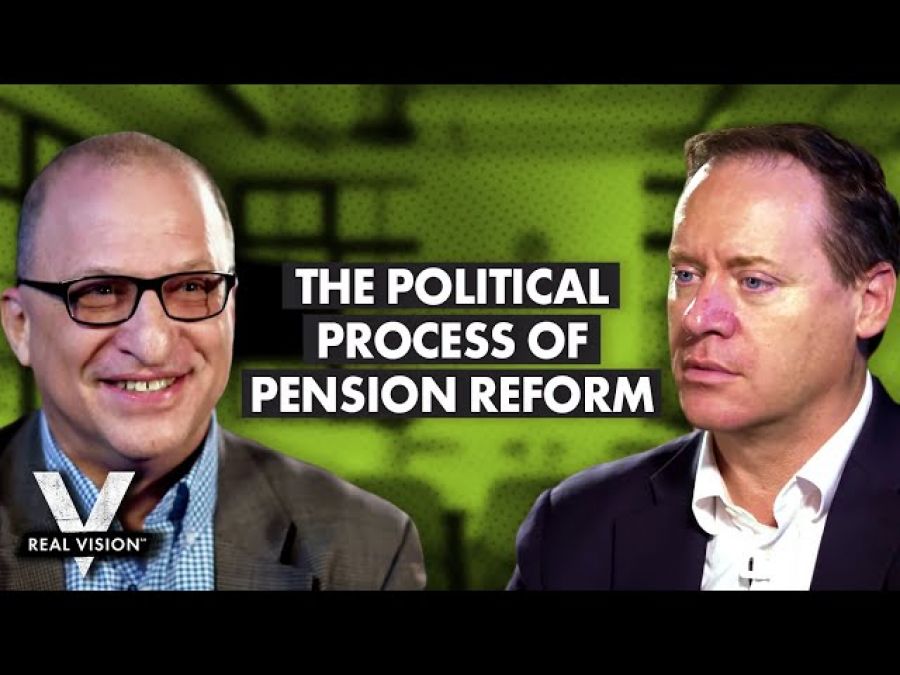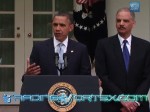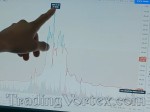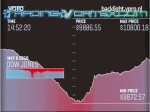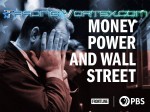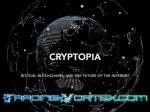Video Transcription:
Solving California's Pension System Political Problem (w/ Steve Greenhut & Steve Green)
MIKE GREEN: What is required to change the political problem? Can it be done on an individual voter basis? Can we all say no, as you suggested that you do? Can we all vote a new generation of leadership in? What is required to affect that political change? STEVE GREENHUT: Well, a lot of people have been working on changing the politics of California and to no avail from what I see. I don't know, I don't think anything's-- I really don't, I'm not trying to be nattering Neva, but I don't think anything will change until there's a fiscal crisis that precipitates change. That's what happened last time. The state shaved its budgets because it just didn't have any money. I remember it was Pennsylvania with some mayor who cut pensions I believe it was. This was in Wilkes-Barre or somewhere around. MIKE GREEN: Hazleton. STEVE GREENHUT: Yeah, it was somewhere in northeast Pennsylvania. Public employees sued. I think that-- I'm doing this from memory so I think they won and then I just remember the mayor saying great, I still don't make money. When you get to the point where it's like, great, I still don't have any money, something will have to be-- MIKE GREEN: No, no, that was Scranton, but yes, you're right. Nothing was solved. We still didn't have any money. It does feel like this is a situation that can't be resolved without suspending some element of the political process. That's what worries me most about it. I know that you have libertarian leanings. It sounds like this is going to have to boil down to an executive decision, whether that's a judge in a bankruptcy case, or whether that's-- STEVE GREENHUT: Like in Detroit, where they had-- or did they have a-- I didn't follow it that closely, I followed Stockton closely, but not Detroit that closely. They had a receiver. MIKE GREEN: They went into receivership. STEVE GREENHUT: Well, I don't think that that speaks to libertarianism one way or the other. If an entity is insolvent, you have to come up with a way to deal with it. Yeah, I don't know. I'm not a big guy on political solutions. MIKE GREEN: You're a reporter at heart. STEVE GREENHUT: Well, no, I write about it. I've dealt with so many people like, oh, here's the pension reform movement. It's a Doggett group and you've, ,in this series here, I know you're talking to some of them. There's some of the smartest people I know and they are working extremely hard at it and trying everything and I see local pension activists in San Jose, who, okay, that's an overwhelmingly democratic city and voters, thereby almost 70% of the vote approved a very significant pension reform and that the Democratic mayor, Chuck Reid, he's a great guy. He led that. I remember once I interviewed him, and I said, so was this something this easy? He looked at me and said, Steve, none of this has been easy. It was hard work. They got overwhelming Democratic majority on the council and in the city to approve pension reform. Then the union sued, and the courts throw it out. In San Diego, the city there, they did something different. They wanted to avoid the California rule problem. They came up with a way to reduce pensionable pay, the pay they can deal with, and that would reduce the pensions, and then they did a few other reforms that were all-- none of it ran afoul the California-- Anyway, the state agency, the PERB, the Public Employment Relations Board, they tossed it out, so you just can't win and you can't win in the legislature. What do you do? MIKE GREEN: Well, and even within that, as you know, we were talking to John Moorlach earlier, he managed to get legislation passed through the two houses to require transparency, electronic transparency of the budgets, XBRL markup, and Gavin Newsom vetoes it. What can be the possible rationale for why he would veto something that actually provides transparency to a process? STEVE GREENHUT: I've seen a lot of transparency bills die over the years because the effective groups don't want transparency. When I had talked earlier about those city officials who came to the CalPERS meeting, they were dealing with a John Moorlach proposal at the time. John, he had proposed some-- it was some Transparency Initiative. That's what they were about, and CalPERS rejected it. Yeah, it's better if we don't know what's going on, and we just trust that them and that's their attitude, it seems. Yeah, you can't get any. John, if you sat down with John, he could fix the whole pension problem in 10 minutes, and then spend the rest of his life and our lifetimes trying to get it through. That's the problem. It's a political problem. I don't know what the answer is to political problems. MIKE GREEN: Yeah. Unfortunately, those who have watched my episodes in the past know that my biggest concern is that we have a stalled political system and that we will ultimately force a non-democratic solution through and pensions tend to be the flashpoint at which the crisis occurs. Most democracies that experience pension crises don't emerge as democracies. Somebody has stepped in in an authoritarian way to solve the problem. STEVE GREENHUT: I haven't thought about what that end result would be, but I look at Washington and okay, we have republicans now and they're spending even more than the previous group of Democrats so it's just, to me, it looks like a two groups arguing over how you spend, it seems to be if Space Forces and military bill dogs, they cost a lot of money too, and all this social welfare programs and Medicare for all, I don't see anybody calling for fiscal responsibility and up in the State Capitol, there all sorts of spending proposals and so the folks up there seem to be content spending as much as they possibly can, you can't have a budget deficit in California and taxing as much as they possibly can. We see on the March ballot, Prop 13 has no relation to the 1978 historic Prop 13 that capped property taxes but this one would-- it's a bond. It's just a school bond, state school bond, but it would increase the debt limit at localities. Local school districts will be able to start passing more bonds and then in November, we're going to have a split roles, which would split away commercial properties from the Prop 13 tax protection. That's another, that's a union backed thing. That's just would be a massive influx of money. I don't see any end to their appetite for taxing and then it just can't tax enough.
